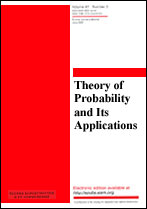|
This article is cited in 18 scientific papers (total in 18 papers)
Asymptotic Optimality in Bayesian Changepoint Detection Problems under Global False Alarm Probability Constraint
A. G. Tartakovskii
University of Southern California
Abstract:
In the 1960s Shiryaev developed the Bayesian theory of changepoint detection in independent and identically distributed (i.i.d.) sequences. In Shiryaev's classical setting the goal is to minimize an average delay to detection under the constraint imposed on the average probability of false alarm. Recently, Tartakovsky and Veeravalli [Theory Probab. Appl., 49 (2005), pp. 458–497] developed a general Bayesian asymptotic changepoint detection theory (in the classical setting) that is not limited to a restrictive i.i.d. assumption. It was proved that Shiryaev's detection procedure is asymptotically optimal under traditional average false alarm probability constraint, assuming that this probability is small. In the present paper, we consider a less conventional approach where the constraint is imposed on the global, supremum false alarm probability. An asymptotically optimal Bayesian change detection procedure is proposed and thoroughly evaluated for both i.i.d. and non-i.i.d. models when the global false alarm probability approaches zero.
Keywords:
asymptotic optimality, changepoint detection, cumulative sum procedure, global false alarm probability, nonlinear renewal theory, Shiryaev's rule, sequential detection.
Received: 11.08.2006
Citation:
A. G. Tartakovskii, “Asymptotic Optimality in Bayesian Changepoint Detection Problems under Global False Alarm Probability Constraint”, Teor. Veroyatnost. i Primenen., 53:3 (2008), 472–499; Theory Probab. Appl., 53:3 (2009), 443–466
Linking options:
https://www.mathnet.ru/eng/tvp2443https://doi.org/10.4213/tvp2443 https://www.mathnet.ru/eng/tvp/v53/i3/p472
|


| Statistics & downloads: |
| Abstract page: | 457 | | Full-text PDF : | 229 | | References: | 86 |
|




 Contact us:
Contact us: Terms of Use
Terms of Use
 Registration to the website
Registration to the website Logotypes
Logotypes








 Citation in format
Citation in format 
